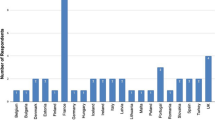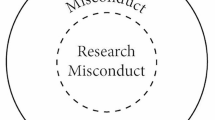Abstract
Education in the medical humanities and ethics is an integral part of the formation of future physicians. This article reports on an innovative approach to incorporating the medical humanities and ethics into the four-year curriculum in a Certificate Program spanning all four years of the medical school experience. The faculty of the McGovern Center for Humanities and Ethics at the University of Texas Medical School at Houston conceived and implemented this program to teach medical students a range of scholarly topics in the medical humanities and to engage the full human experience into the process of becoming a physician. This study follows six years of experience, and we report student experiences and learning in their own words.
Similar content being viewed by others
References
Accreditation Council for Graduate Medical Education (ACGME). 2012. Professionalism Resolution. (http://www.dconnect.acgme.org/acWebsite/home/ACGMEBODResolutionAdopted.pdf)
Belling, C. 2010. "Sharper Instruments: On Defending the Humanities in Undergraduate Medical Education." Academic Medicine 85(6): 38-940.
Bellini, L. and J. Shea. 2005. "Mood Change and Empathy Decline Persist during Three Years of Internal Medicine Training." Academic Medicine 80(2): 164–167.
Cohen, J. J. 2007. "Linking Professionalism to Humanism: What it Means, Why it Matters." Academic Medicine 82(11): 1029–1032.
Cooke, M., D. M. Irby, B. C. O'Brien, and L. S. Shulman (2010). Educating Physicians: A Call for Reform of Medical School and Residency. (http://www.carnegiefoundation.org/newsroom/press-releases/educating-physicians-call-reform-medical-school-and-residency)
Coulehan, J. and P. Williams. 2001. "Vanquishing Virtue: The Impact of Medical Education." Academic Medicine 76: 598–605.
Doukas, DJ, McCulloug, L., Wear, D. 2010. "Reforming Medical Education in Ethics and Humanities by Finding Common Ground with Abraham Flexner." Academic Medicine 85(2): 318–323.
Einstein, Albert and Alice Calaprice. 2011. "On Education, Students, and Academic Freedom." In The Ultimate Quotable Einstein, edited by Freemon Dyson, 97–110. Princeton, NJ, Princeton University Press.
Graves, L. 2008. "Teaching the Wounded Healer." Medical Teaching 30(2): 217–219.
Hafferty, F. W. (2006). "Professionalism - The Next Wave." New England Journal of Medicine 355(20): 2151–2152.
Haidet, P., Hatem, DS, Fecile, ML, Stein, HF, Haley, H, Kimmel, B. 2008. "The Role of Relationships in the Professional Formation of Physicians: Case Report and Illustration of an Elicitation Technique." Patient Education and Counseling 72(3): 382–387.
Holden, M., Buck, E, Clark, M, Szauter, K, Trumble, J. 2012. "Professional Identity Formation in Medical Education: The Convergence of Multiple Domains." HEC Forum 24: 245–255.
Kaufman, W. 1978. "Is There a Kind of Knowledge Available Only Through Humanistic Studies?" In The Humanities and Public Life, edited by W. L. Blizer, 19–32. London, Pied Publications.
Lama, D. 1998. The Art of Happiness. New York, NY, Riverhead Books.
Malina, B. 1978. "What are the Humanities: A Perspective for the Scientific American." In The Humanities and Public Life, edited by W. L. Blizer, 33–47. London, Pied Publications.
Monrouxe, L., Rees, C, Hu, W. 2011. "Differences in Medical Students' Explicit Discourses of Professionalism: Acting, Representing, Becoming." Medical Education 45: 585–602.
Ngaire, K., Buetow, S, Mainous, A, Young, G, Coster, G, Arroll, B. 2004. "Physician-Patient Relationship and Medical Compliance: a Primary Care Investigation." Annals of Family Medicine 2(5): 455–461.
Niemi, P. 1997. "Medical Students' Professional Identity: Self-Reflection during the Preclinical Years." Medical Education 31: 408–415.
Petrarch, Francesco. 1948. "Ascent of Mont Ventoux." In The Rennaissance Philosophy of Man: Petrarca, Valla, Ficino, Pico, Pomponazzi, Vives, edited by E. Kassirer, P. O. Kristeller and J. H. J. Randall, 36–47. Chicago, Ill, University of Chicago Press.
Pratt, M., Rockmann, KW, Kaufmann, JB. 2006. "Constructing Professional Identity: The Role of Work Identity Learning Cycles in the Customization of Identity among Medical Residents." Academy of Management Journal 49(2): 235–262.
Proctor, R. E. 1998. Defining the Humanities: How Rediscovering a Tradition Can Improve Our Schools. Bloomington, IN, Indiana University Press.
Rhodes, F. H. T. 2001. The Creation of the Future: The Role of the American University. Ithaca, NY, Cornell University Press.
Sandelowski, M. 2000. "Whatever Happened to Qualitative Description?" Research in Nursing 23(4): 334–340.
United States Holocaust Museum. "Deadly Medicine: Creating the Master Race." (http://www.ushmm.org/information/exhibitions/online-features/online-exhibitions/deadly-medicine-creating-the-master-race)
Wear, D. and J.M. Aultman. 2007 "Creating Difficulties Everywhere." Perspectives in Biology and Medicine 50(3): 348–362.
Acknowledgments
The author wishes to thank the faculty at the Center for help with conceptualization of the program and assistance with the many details involved in running this program, as well as comments on earlier versions of this paper.
Conflicts of Interest
The author declares that the author has no conflict of interest.
Funding
Funding for the Medical Humanities and Ethics Certificate Program was generously provided by an endowment from the John P. McGovern Foundation.
Author information
Authors and Affiliations
Corresponding author
Additional information
1 http://medhum.med.nyu.edu/ We define the term "medical humanities" broadly to include an interdisciplinary field of humanities (literature, philosophy, ethics, history and religion), social science (anthropology, cultural studies, psychology, sociology), and the arts (literature, theater, film, and visual arts) and their application to medical education and practice.
2 http://medschool.ucsf.edu/aoc/humanities/mission.aspx For the purposes of this program, we define "humanities" quite broadly to include traditional fields (literature, rhetoric, philosophy, religious studies, ethics and history, for example); creative writing and the arts (visual, theater, media); as well as the humanities-oriented social sciences (anthropology, sociology, for example).
3We did not keep track of ethnic, racial, sexual orientation, or other demographic categories. Our students came from a broad geographic range – from all over the United States, Russia, Australia, Africa (Kenya), the middle east (Turkey), Asia (India, Pakistan), Europe (France) and Central America (Guatemala). They also came from diverse perspectives with formal training in the biological and physical sciences, drama, music, literature, social sciences, business, and engineering. We try to be open to everyone who wishes to join the Program.
4Because some students took a year off for personal reasons our graduation rate is slightly higher than indicated by these numbers. Of the students who dropped out of the program most withdrew for personal reasons including time constraints due to the need to care for younger siblings, serious illness of their own or family members, or academic difficulties necessitating additional focus on basic sciences. The three students who withdrew during their fourth year all cited an inability to complete the required Medical Humanities elective and also complete an out of town rotation required for their desired residency.
Appendix
Appendix
ᅟ
Rights and permissions
About this article
Cite this article
Erwin, C.J. Development of a Medical Humanities and Ethics Certificate Program in Texas. J Med Humanit 35, 389–403 (2014). https://doi.org/10.1007/s10912-014-9306-4
Published:
Issue Date:
DOI: https://doi.org/10.1007/s10912-014-9306-4




